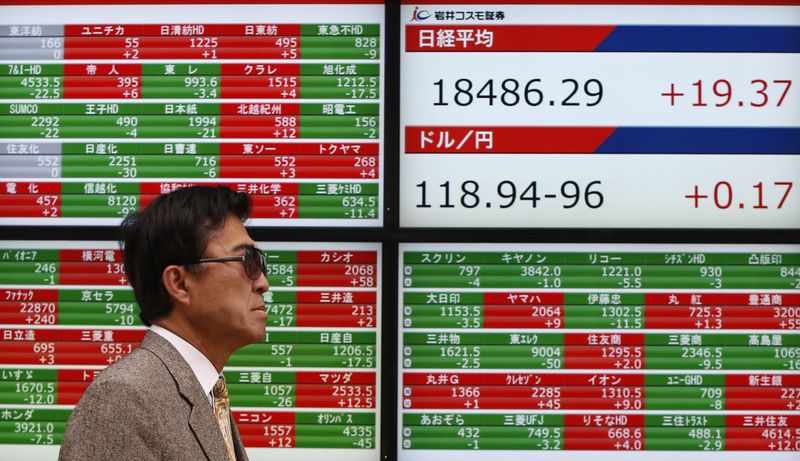Investing.com-- Asian stocks extended steep losses on Friday as a rout in global bond markets continued to decimate risk appetite, while traders remained on edge over any more escalation in the Israel-Hamas war.
Regional markets were spooked by a sharp sell-off in global bonds this week, which reached a fever pitch on Thursday after comments from Federal Reserve Chair Jerome Powell indicated that an interest rate hike was still being considered this year.
A slew of other Fed officials mirrored Powell’s stance, especially as recent data pointed to stickiness in U.S. inflation. Wall Street indexes closed lower overnight following a spike in Treasury yields, providing a weak lead-in to regional markets.
Higher interest rates bode poorly for Asian markets, given that they diminish their risk-heavy appeal, and also limit foreign capital flowing into the region.
Sticky inflation dents Japan’s Nikkei, weekly losses on tap
The Nikkei 225 index sank 0.6%, and was on course for a 3.2% loss this week as data on Friday showed that Japanese consumer price index inflation grew more than expected in September.
A core inflation reading, which is closely watched by the Bank of Japan, also remained close to over 40-year highs, indicating that underlying inflation remained sticky.
Comments from former BOJ officials also suggested that the bank could end its negative rate regime by as soon as December, ending nearly a decade of easy monetary policy enjoyed by Japanese stocks. Loose monetary conditions were a key driver of a Japanese stock rally this year, which saw the Nikkei reach 30-year highs.
Yields surge, Asian tech under pressure
A spike in global bond yields weighed heavily on Asian technology stocks this week, as the prospect of higher interest rates diminished the appeal of growth stocks. South Korea’s KOSPI was among the worst hit by this trade, sliding nearly 2% on Friday.
Weakness in heavyweight tech stocks dragged Hong Kong’s Hang Seng index down 0.7%, with the index also set to severely lag its Asian peers this week with a 3.9% drop.
Losses in technology stocks weighed on Australia’s ASX 200 index, which fell 1.3%. Losses in mining stocks, tracking weaker metal prices and middling production reports, also weighed on the ASX 200 this week, putting it on course for a loss of 2.2%.
Futures for India's Nifty 50 index pointed to a weak open, as weakness in tech stocks dragged the index lower this week.
Chinese stocks at 2023 lows as property jitters persist
Chinese stocks saw small losses on Friday, but were set for steep weekly declines as persistent concerns over the country’s property sector largely offset data showing stronger economic growth.
China’s Shanghai Shenzhen CSI 300 index fell 0.1% and was trading close to a one-year low, while the Shanghai Composite index fell 0.2% and was also at a near one-year low. Both indexes were set to lose between 1.7% and 2.2% this week.
A lack of clarity on a potential default by Country Garden Holdings (HK:2007) kept traders largely wary of Chinese assets, after the beleaguered property developer apparently missed a key payment on its international bonds this week. Reports said the firm was now seeking more talks with bondholders.
China’s central bank kept its benchmark loan prime rate on hold at record lows on Friday, as widely expected.
